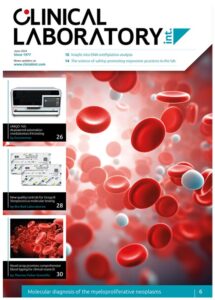Gene testing gets primed for the mass market
Questions about gene testing were highlighted dramatically this summer after Hollywood superstar Angelina Jolie announced she had undergone a preventive double mastectomy. The reason: gene tests showed she carried the breast cancer-linked BRCA1 mutation. In an Op-Ed piece in the ‘New York Times’, the actress encouraged other women, who believed they were also at risk, to also get tested.
Ms. Jolie’s decision has been hailed by some, criticized by others. However, it may well mark a watershed, when gene testing began a paradigm shift to the mass market. Her announcement, for example, led to a doubling of cancer checks at top clinics in London.
US Patent ruling will bring costs down
Such trends are likely to be reinforced, strongly, by a US Supreme Court ruling in June 2013 (shortly after Ms. Jolie’s announcement) that human genes cannot be patented. The decision reversed three decades of US intellectual property case law, and within days, several US labs announced they would be offering BRCA tests. The latter could previously only be tested for by a single company, Myriad Genetics. Though patent laws are national matters, it is likely that the US court ruling will make an impact elsewhere. In Europe, the EU Biotech Directive allows patenting of gene tests, while Myriad itself recently won a Federal Court ruling in Australia upholding its BRCA patents.
Revenues from genetic screening were $5.9 billion in the US in 2011, according to a study by the respected Battelle Institute. To put the figure in perspective, this is about 10% of the total US clinical testing market. Globally, sales of genetic tests could be conservatively estimated at $10-$15 billion. Scores of vendors already offer a range of tests – from selective screening for some hundred-odd major disease genes to complete sequencing of a person’s genome.
The once-prohibitive costs of gene tests have seen downwards pressure over the past decade. As with other consumer technology cycles, lower prices are expected to drive an expansion in affordability, in users and revenues, in a virtuous cycle. One of the key market catalysts has been direct-to-consumer testing (DTC) companies. US DTC leader 23AndMe has seen its gene tests used by about 200,000 consumers. For just $99, the company provides information on 50 carrier traits, 20 drug classes and disease risk information. 23AndMe is currently seeking FDA certification. European firms are less visible. A leading vendor, deCode Genetics, shut down its DTC service after being acquired by Amgen in late 2012. The Iceland-based firm had been offering its deCodeme personal genomic scanning service for just under $1,000, as well as screening for cardiovascular diseases and common cancers – in a package for $350. Other major DTC players in Europe are also from the US, among them Navigenics, DNADirect and Genelex.
Price falls are now almost certain to accelerate after the US Supreme Court decision on gene patents. Myriad, for example, was using its monopoly on BRAC to charge $3,000 and more for a test. After the Court ruling, the test is projected to see a steep fall in its price to just $100.
Drivers of consumer tests
The key reason for the growth of DTC is that genetic testing has so far largely been restricted to specialist labs and top academic medical centres. In spite of a sharp rise in the number of registered tests to over 7,500, most have yet to be translated into clinical applications.
A study by United Health, the US managed health group, found 63% of physicians saying that screening provided them “the ability to diagnose conditions that would otherwise be unknown.” However, a larger number, about three of four, also noted there were patients in their practices “who would benefit from a genetic test but have not yet had one.” United Health estimates that the US testing market alone would reach about $15 to $21 billion by 2021. In Europe too, an increase in formal healthcare settings for gene testing is likely to be welcomed, given growing concerns about DTC. A recent survey of clinical geneticists found 84% of respondents expressing concern about “replacing face-to-face supervision by a medical doctor with supervision via telephone” through DTC testing firms. A little less than half the respondents said they had at least one patient make contact with them after they had undergone a DTC genetic test, and 86% said they would provide post-test counselling to such patients. The survey posed the likelihood of a ‘cascade effect’ in the future, particularly should physicians spend more time on patients with DTC test results that are not medical priorities. As a result, it seems market growth will be accompanied by the encouragement of general hospitals and physician practices to do gene testing.
The emergence of personal medicine
The impact of mass gene testing will clearly be enormous. One new frontier is personal medicine, where medicine choice and dosages would be prescribed according to a patient’s specific genetic profile. Further down the horizon may be an end to several inherited diseases. In January 2009, the UK saw the birth of the first baby “tested preconceptionally for a genetic form of breast cancer.” The baby was born at University College London (UCL) Hospital, using Preimplantation Genetic Diagnosis, which involves undertaking an in vitro fertilization treatment cycle to have several embryos available for genetic tests.
More recently, UCL announced that its scientists had developed a microchip test to analyse 35 different genetic mutations linked to cancer, and enable doctors to identify and target specific genes from a small sample of tissue. UCL Professor Charles Swanton said the test marked the beginning of tailored cancer care in the NHS.
Ethical questions remain
Nevertheless, there is some way to go. One barrier consists of still-lingering questions about the ethical implications of gene tests.
Here, the first issue is uncertainty. Even now, gene testing (including that for the high-profile BRCA 1 and 2) only predicts an increase in risk, not certainty of disease. This transfers the choice and responsibility for an irreversible prophylactic intervention to a patient, and to his or her best guess. It also rules out the possibility of effective, new and less-invasive surgical interventions emerging in the future.
Such technology evolution challenges – of better choices becoming available – apply broadly to all genetic testing. Some tests do not (as yet) identify all possible gene mutations which lead to a particular disease, or have only limited predictive value. Finally, it remains unclear whether a mutation is not just a symptom of a disease, rather than being a cause.
For example, in cystic fibrosis (CF), there is still no way to predict disease severity, even when a fetus has inherited two mutations. Parents thus face the dilemma of deciding whether to continue or end a pregnancy without full knowledge. In the meanwhile, even as data on CF mutations grows steadily by the year, promising new drug therapies are becoming available. For example, Ivacaftor (Vertex Pharmaceuticals), which addresses the G551D mutation affecting 4% of CF patients, is now being evaluated for the more prevalent F508del mutation.
The above dilemmas are aggravated by the question of false positives and false negatives. In spite of being at the cutting edge of mass screening techniques for Down’s syndrome and neural tube defects, Quad tests for pregnant women still retain a 5% false positive and 20% false negative rate. Elsewhere, while metabolic genetic disorders such as phenylketonuria can be identified by fetal gene tests and then addressed by dietary changes, many others lack treatment options.
The broader debate on gene tests and its ethics is unlikely to go away soon, but policy makers are broadly swinging to accept its inevitability. The Human Genetics Commission in Britain stated in April 2011 that there were “no ethical barriers preventing the use of genetic testing in couples before they conceive.” Within months, the German parliament enacted a law to allow testing fertilized embryos for possible life-threatening genetic defects, via Preimplantation Genetic Diagnosis (like that launched by University College London in early 2009). Critics in Germany have been especially vociferous, calling the move “a step toward designer babies.”
One of the biggest concerns about genetic testing is the emergence of ‘a la carte’ health insurance, providing choice of cover and premium based on a person’s particular disease risks and (eventual) treatment requirements, rather than loading the highest-risk beneficiaries atop the lower-risk ones.
In the US, resulting concerns about discrimination due to genetic testing led to the 2008 Genetic Information Nondiscrimination Act (GINA), which bars denial of health insurance or employment because of a genetic predisposition to a particular disease.
In Europe, different laws and regulations in the Member States seek to address ethical questions. A major hurdle here is the lack of an “approved definition of a genetic test,” in spite of the EU-funded project EuroGentest. One of the latter’s goals was to “try to develop at least some key elements for a working definition” of a gene test.



